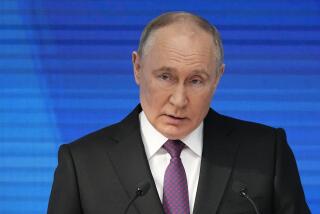Showdown Time in the Soviet Union
- Share via
Boris Yeltsin has now given his emphatic answer to Soviet President Mikhail Gorbachev’s recent emotional plea for national unity in the face of rising separatist movements and deepening economic adversity. The response from the president of the vast Russian Republic was to declare open political war on Gorbachev, and on the central rule of the renascent and increasingly hard-line Communist Party.
Gorbachev, Yeltsin demanded, must go. Echoing former Foreign Minister Eduard Shevardnadze’s resignation speech last December, Yeltsin accused Gorbachev of deception and of deliberately leading the nation back down the path to dictatorship. In 1917 the Bolsheviks seized the reins of government under the slogan of “All power to the soviets!” Now Yeltsin demands that all power be transferred from the party to the council composed of the presidents of the 15 republics, the largest of which he heads. That would be tantamount to a peaceful coup d’etat. It also would inevitably transform Yeltsin into the country’s most powerful political figure. The Communist Party, despising Yeltsin as a dangerous apostate and with its liegemen still firmly entrenched in the army and the secret police, could be expected to use every means to resist that prospect.
Yeltsin, a populist and on occasion a demagogue, is again demonstrating his keen sensitivity to public attitudes. Dissatisfaction with current conditions and fears about the future shape the popular mood today. As in any country, it is the leader who is held accountable. For all the talk of reform and progress, the last four years have seen living and health standards deteriorate significantly. Food has become scarcer; those economic changes that have occurred have been seen by the Soviet people as more painful than productive. Probably most people are not overly concerned about the renewed controls over the press and the armed crackdowns that have occurred in Latvia and Lithuania. But close observers of the Soviet Union report a widening sense of unease and fear of spreading chaos. The far-right, panting for the restoration of Communist orthodoxy, thinks this mood can be manipulated to quash the democratic reforms and experiments with a market economy. It may well be right.
Yeltsin, of course, is betting otherwise. Unlike Gorbachev and the party, he has no vested interest in holding the union together. At a minimum, he wants the Russian Republic to be able to go its own way, free of central controls. His explosive attack on Gorbachev signals a readiness to pursue that goal more vigorously than ever. The feeling grows that a showdown is coming in the Soviet Union, one whose outcome will unavoidably have profound international consequences.
More to Read
Sign up for Essential California
The most important California stories and recommendations in your inbox every morning.
You may occasionally receive promotional content from the Los Angeles Times.













